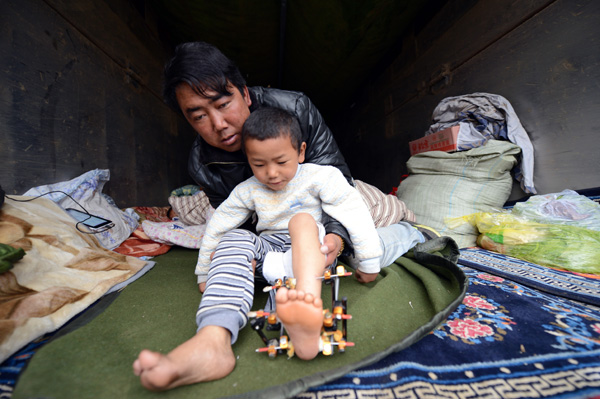A Tibetan man helps his 7-year-old son, whose leg was injured in the quake. [Photo/Xinhua]

Damage greater than expected, according to region's Party chief
Snow and landslides are hampering the efforts of rescue and relief task forces trying to reach the southern parts of the Tibet autonomous region affected by Saturday's earthquake in neighboring Nepal.
Zham, a China-Nepal border pass in Nyalam county, remained closed on Monday night, with 6,000 people stranded. Rescuers have reopened the road from Xigaze to Nyalam but 30 kilometers of the road from Nyalam to Zham remain blocked.
Aftershocks frequently trigger new landslides that block stretches of road that have been cleared.
Nyalam county sent 53 people as a task force to Zham. But the only tunnel 10 km away was completely buried, forcing them to return, the county government said.
The Gyirong pass, with 180 residents, has also been badly hit and blocked by landslides at more than 20 places.
Roads, communications and power supplies have been cut in Rongxar, Tingri county. Snow on the road leading to the town, where houses collapsed following the 7.9-magnitude - revised from earlier reports of 8.1-magnitude - quake in Nepal, made access difficult. Twelve soldiers managed to reach the town on Monday.
In the worst hit town more than 95 percent of houses collapsed, according to Shen Yong, head of the team. More than 100 soldiers are on their way with tents, quilts and bottled water, he added.
Chengdu Military Base sent nine helicopters to Zham, Gyirong and other isolated places to deliver essential supplies and transport injured people back to Xigaze on Monday.
"The earthquake's damage to Tibet and difficulty in rescue are both greater than expected," said Chen Quanguo, Party chief of the region, on Monday afternoon at a meeting in Lhasa.
He said saving people's lives and avoiding further loss of life are the priority of rescue work in the first 72 hours after a natural disaster.
"To ensure essential supplies reach the isolated towns, we should carry them on our shoulders to overcome the 'last mile' of obstacles on the roads," Chen said.
He urged rescuers from the army, government and social organizations to collaborate to ensure an orderly and efficient rescue operation.
As of Monday night, the death toll in Tibet was 20. Four people are missing, and 58 others are injured. Nearly 25,000 people have been evacuated from their homes, and the earthquake has affected about 300,000 people.
On the northern slope of Qomolangma, also known as Mount Everest, where no avalanches occurred, hundreds of climbers were camped in tents.
Neda Jahangiri, a tourist from California, was retreating from the climbing base on the mountain to Xigaze, and said: "The climbers were not frightened, because we took good care of ourselves and we have good tour guide, a professional driver, and security. The military and the police took good control of the situation."
Paymun, her husband, said: "Our travel agency in Lhasa contacted us every hour to make sure we were safe."
Daqiong, Palden Nyima and Xinhua contributed to this story.
liyang@chinadaily.com.cn
